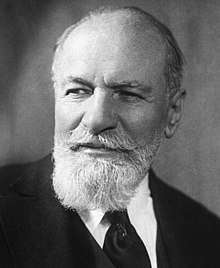Vladimir Nemirovich-Danchenko
Vladimir Ivanovich Nemirovich-Danchenko (Russian: Владимир Иванович Немирович-Данченко; 23 December [O.S. 11 December] 1858 – 25 April 1943, Moscow), was a Russian and Soviet theatre director, writer, pedagogue, playwright, producer and theatre administrator, who founded the Moscow Art Theatre with his colleague, Konstantin Stanislavski, in 1898.

Biography
Vladimir Ivanovich Nemirovich-Danchenko was born into a Russian noble family of mixed Ukrainian-Armenian descent, in the village of Shemokmedi near Ozurgeti (Guria, Georgia). His father, Ivan Danchenko, was an officer in the Imperial Russian army, and his mother, Alexandra Yagubyan (1829–1914), was Armenian from the Governorate of Tiflis. He went to high school in Tbilisi, continuing his education at Moscow State University (physical-mathematical and juridical departments 1876–79).
In 1879 he left the University for the theatre, starting as a theatre critic, and in 1881, his first play "Dog-rose", which was staged in one year by Maly Theatre, was published. He was a teacher of Ivan Moskvin, Knipper and Meyerhold.[1]
In 1919, he established the Musical Theatre of the Moscow Art Theatre, which was reformed into the Nemirovich-Danchenko Musical Theatre in 1926.[1] In 1943 Nemirovich-Danchenko established the Moscow Art Theatre School, which is still extant.
He died of a heart attack on 25 April 1943, aged 84, in Moscow.
Legacy
Nemirovich-Danchenko's Moscow Art Theatre staged Chekhov and Gorky drama with theretofore unknown naturalism and full expression. In addition, his theatre presented highly acclaimed Dostoevsky and Tolstoy dramatizations. It has been said that "If Stanislavski was the soul of Art Theatre, then Nemirovich was its heart".
Nemirovich-Danchenko created the Moscow Art Theatre's acting and directing style, known for "actors ensemble" and its "atmosphere". Because of his directorial and production skills, the Moscow Art Theatre was considered, at the time, the best theatre in the world. But Nemirovich didn't write down his acting "system"and we know only the "system of Stanislavski". He was one of the first recipients of the title of People's Artist of the USSR in 1936. Later, he was awarded the USSR State Prize (1942, 1943), the Order of Lenin (3 May 1937), and Order of the Red Banner of Labour (25 February 1936).
Productions
- The Brothers Karamazov (1910)
- Resurrection (1930)
- Anna Karenina (1937)
- Three Sisters (1940)
References
- Sergei Bertensson; Paul Fryer; Anna Shoulgat (2004). In Hollywood with Nemirovich-Danchenko, 1926–1927: the memoirs of Sergei Bertensson. Scarecrow Press. pp. 16–. ISBN 978-0-8108-4988-4.